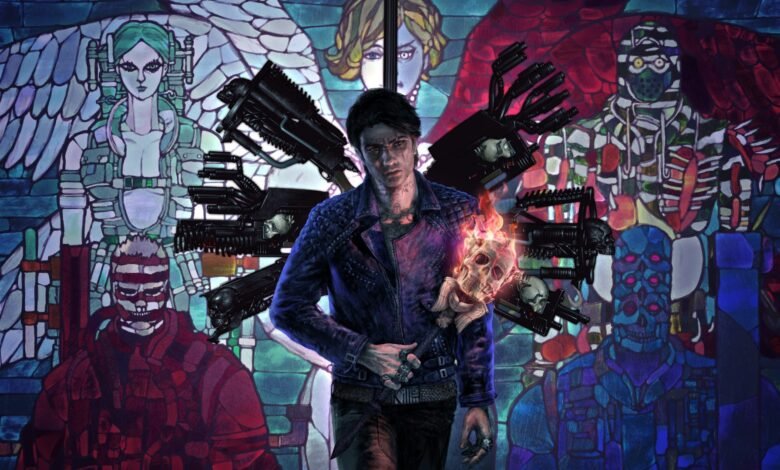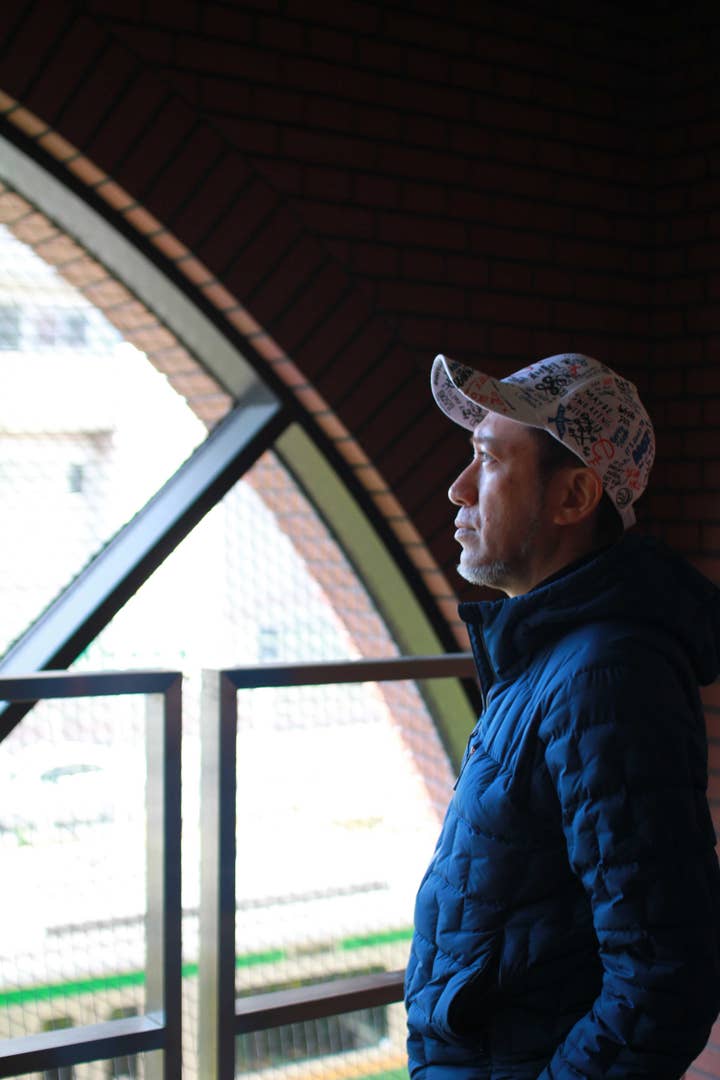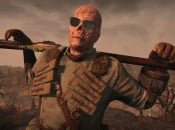A second chance for Shinji Mikami and Suda51’s lesser-known collaboration

There hasn’t exactly been a dearth of remasters over the past decade, with many of the most acclaimed titles from previous generations finding their way to modern consoles, either polished and tweaked to meet today’s standards or rebuilt from the ground up.
The Last of Us, Final Fantasy 7, Mass Effect, Dead Space, various Resident Evils, a range of Nintendo classics – the list of games that have been brought back for new audiences goes on. One entry you might not expect to see on the list is Shadows of the Damned.
If you’re unfamiliar with the name, you’ll certainly know the visionaries behind it; Shadows of the Damned is the second collaboration between Japanese legends Shinji Mikami, director of the original Resident Evil, and Goichi ‘Suda51’ Suda, known for the No More Heroes series.
Released in 2011, Shadows of the Damned was a ‘punk rock’ action adventure game in which a Mexican demon hunter fights against the forces of evil – with the help of his demon sidekick Johnson, who can transform into a gun, torch and motorbike – to save his girlfriend.
It was published by Electronic Arts for PlayStation 3 and Xbox 360, and this year it returns to consoles and PC thanks to NetEase, the parent company of Suda’s studio and Shadows’ developer Grasshopper Manufacture.
GamesIndustry.biz caught up with both Suda and Mikami at Gamescom, who told us this is not the first time they have tried to revive the 2011 title.
.jpg?width=720&quality=70&format=jpg&auto=webp)
“About seven or eight years ago, we got an offer from someone to remaster Shadows of the Damned and we thought that sounded cool,” Suda explains. “So we talked to EA about it, and they were like, ‘yeah, sure, but it’s got to be an Origin exclusive’ and that put us off a bit at the time. If it could only be on Origin, that would defeat the purpose of bringing it out again so more people can play it.
“Then a couple of years ago, around the time we joined NetEase, the idea came up again so we spoke to EA about it and the Origin thing was no longer an issue. So since we’re able to do it on all the platforms we wanted, it was the perfect timing. We’ve been wanting to do it for years now – and maybe we can get people to actually know about it this time,” he laughs.
Suda adds that this is part of Grasshopper’s efforts to make more of its back catalogue available on modern systems. Since 2016, the studio has worked with partners such as Engine Software – the developer of the Shadows of the Damned remaster – to bring back seven titles, including the No More Heroes trilogy, with another – 2012’s Lollipop Chainsaw – still to come.
The majority of Grasshopper Manufacture is working on a brand new IP, so what is Suda and Mikami’s involvement in Hella Remastered? Suda describes Mikami as “kind of a special guest for us,” with the development veteran assisting with promotional efforts (such as press interviews at Gamescom). Meanwhile, Suda is the remaster’s general producer.
“I basically sign shit,” he smiles. “We get lots of invoices and stuff.”
“We’ve been wanting to [remaster Shadows of the Damned] for years now – and maybe we can get people to actually know about it this time”
Goichi ‘Suda51’ Suda
Shadows of the Damned wasn’t the first game Suda and Mikami worked on together. Their first collaboration was 2005 GameCube and PlayStation 2 title Killer7. But while this has lived on as a cult hit, Shadows of the Damned is less popular and suffered somewhat at launch.
“When the original came out, I did want to have a lot more people so being able to put it out on more platforms is definitely a good thing,” says Mikami.
Suda adds: “A couple of years before Shadows of the Damned came out, there was another game that was themed around hell and rock music, Brutal Legend. A lot of attention went to that game. Another thing was, right around the time they should have been promoting Shadows of the Damned, EA decided to put all of its budget into Battlefield so it didn’t really get the promotion we felt it deserved. So because of these things, there weren’t nearly as many people that were aware of the game as there should have been. That’s the main reason it didn’t meet our expectations.”
The lack of fanfare at launch is not their only regret. Both Suda and Mikami have discussed in past interviews how Shadows of the Damned went through development troubles from the conception stage. Originally it began life as the horror title Kurayami before being adapted into something new when that struggled to find a publisher.
After finally landing a deal with Electronic Arts, the publisher is said to have requested several changes to Suda’s vision, including giving players a gun from the start to cater to Western tastes.
You would think this would be the opportunity for Suda and Mikami to remake the game completely, bringing that initial concept to life, but the former notes that, regardless of troubles Shadows of the Damned went through, it was a complete game by launch.
“It may not have been the game we set out to make when we began but it’s the game we ended up deciding to make,” he says. “The scenario that Shadows of the Damned was born from was actually the sixth draft of the scenario we’d originally come up with, and each of the drafts that had come before were completely different, so if we were to make one of those games, it wouldn’t really be a remake of Shadows of the Damned, it would just be a completely different game all on its own.”
.jpg?width=720&quality=70&format=jpg&auto=webp)
The pair add that their expectations are a little more conservative this time around. There are considerably more games released each week today than there were in 2011, but Mikami is confident they can reach the specific audience they’re targeting.
“It’s probably going to be difficult to have a huge amount of people find out about it this time – but now there are enough people out there who know about the weird ass stuff that Suda makes and like that kind of thing,” he says. “So I feel the game at least has the chance to reach the people who would like to try it.”

Fans may hope that revisiting their previous collaboration has inspired Mikami and Suda to work together again, but both suggest that’s unlikely to happen any time soon. Even hypothetically, they are stumped as to what another joint venture might look like.
“It’s hard to say what sort of game we would make because one of us would have to come up with an idea and pitch it to the other so that we both think, ‘Yeah, that’s cool, let’s do that’,” says Mikami. “If one of us comes up with a cool idea, I’d like to make that.”
“Generally, if we’re going to work together it will be Mikami as producer and myself as director. I don’t think it would work out the other way around,” Suda laughs. “So the way that’s more likely to happen is if I come up with an idea, write a scenario or project sheet, and propose it to him. If he digs it, that’s the new game we’d work on.”
At this point, Suda turns to Mikamo and says: “There’s actually an idea I came up with a long time ago, you probably don’t remember, it was called Zombie Rider.”
“No, I remember that,” Mikami responds. “Back when I was working at Platinum Games.”
Zombie Rider never got off the ground, however – not because of the idea, but because of the market around it, Mikami recalls.
“Ghost Rider, the Nicholas Cage movie, had just come out and I thought it was a bit too close to that,” he explains. “People might think it was a rip-off.
“Another reason is there was a game that [Hideki] Kamiya was making at Platinum at the time, and looking at the scenario sheet Suda showed me, I felt it was a bit too close to that as well. I didn’t want to have something too close to what Kamiya was making, although I believe that changed into something else. I also felt it was too close to Dead Rising.”
“Maybe it just wasn’t fucked up enough,” Suda laughs. “If it was a bit more fucked up, maybe Mikami would have been into it. But it just didn’t have that level of ‘what the hell is going on in this game?'”
Mikami adds: “If Suda is able to make that, I’d like to see him try.”




